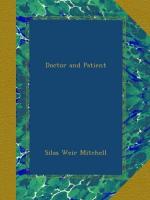There are, as I have said, two periods when such an effort is wise,—the days of health, or of the small beginnings of nervousness, and of the uncontrol which is born of it, and the time when, after months or years of sickness, you have given back to the patient physical vigor, and with it a growing capacity to cultivate anew those lesser morals which fatally wither before the weariness of pain and bodily weakness.
When you sit beside a woman you have saved from mournful years of feebleness, and set afoot to taste anew the joy of wholesome life, nothing seems easier than with hope at your side, and a chorus of gratitude in the woman’s soul, to show her how she has failed, and to make clear to her how she is to regain and preserve domination over her emotions; nor is it then less easy to point out how the moral failures, which were the outcome of sickness, may be atoned for in the future, now that she has been taught to see their meaning, their evils for herself, and their sad influence on the lives of others.
To preach to a mass of unseen people is quite another and a less easy matter. I approach it with a strong sense that it may have far less certain utility than the advice and exhortation addressed to the individual with such force as personal presence, backed by a knowledge of their peculiar needs, may give. I am now, then, for the first time, in the position of the higher class of teachers, who lay before a multitude what will be usefully assimilated by the few.
If my power to say what is best fitted to help my readers were as large as the experience that guides my speech, I should feel more assured of its value. But sometimes the very excess of the material from which one is to deduce formulas and to draw remembrances is an embarrassment, for I think I may say without lack of modesty in statement, that perhaps scarce any one can have seen more of women who have been made by disease, disorder, outward circumstance, temperament, or some combination of these, morbid in mind, or been tormented out of just relation to the world about them.
The position of the physician who deals with this class of ailments, with the nervous and feeble, the painworn, the hysterical, is one of the utmost gravity. It demands the kindliest charity. It exacts the most temperate judgments. It requires active, good temper. Patience, firmness, and discretion are among its necessities. Above all, the man who is to deal with such cases must carry with him that earnestness which wins confidence. None other can learn all that should be learned by a physician of the lives, habits, and symptoms of the different people whose cases he has to treat. From the rack of sickness sad confessions come to him, more, indeed, than he may care to hear. To confess is, for mysterious reasons, most profoundly human, and in weak and nervous women this tendency is sometimes exaggerated to the actual distortion of facts. The priest




